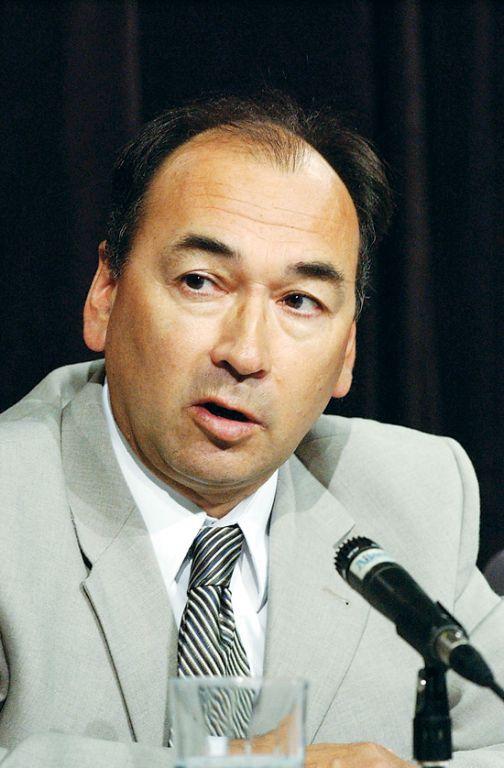By Barb Sweet
The Telegram
November 22, 2010
http://www.thetelegram.com/News/Local/2010-11-22/article-1984068/Ottawa-failed-aboriginal-students-judge/1
 |
| James Igloliorte |
The federal government slighted aboriginals in this province by not including them in an apology for its residential schools policy, says a retired court judge.
"The obligation of the federal government is to acknowledge its duties towards aboriginal people as well where there are clear instances of wrongdoing or at least lack of care, situations where you would expect proper federal governance," said James Igloliorte, who attended a residential high school in North West River beginning in 1963.
"The federal government has to acknowledge that and should clearly apologize."
Earlier this month, the federal government put its case to the Newfoundland and Labrador Sup-reme Court of Appeal to prevent a class action over alleged abuse and loss of culture at residential schools in this province.
Thousands of the former students won the right in June to sue the federal government when the class-action lawsuit was certified by Justice Robert Fowler of the Newfoundland and Labrador Sup-reme Court, trial division.
But the Attorney General of Canada is appealing that decision, saying Fowler erred because aboriginals here were not covered by the federal Indian Act. It also asserts after 1949, when the province entered Confederation, Ottawa merely funded programs and services, but did not run them.
The case involves Labrador Metis, Innu and Inuit students who attended five schools between 1949 and when the last one closed 30 years later. They seek damages over allegations of sexual and physical abuse, along with cultural losses.
The class-action lawsuit involves the Yale, Lockwood, Makkovik, Nain and St. Anthony schools. Moravian Missionaries ran two schools, while the International Grenfell Association ran three.
Igloliorte, who said he was not physically or sexually abused, attended the Yale School.
He is originally from Hopedale, but that community, like others along the coast, did not have a high school.
Igloliorte lived in the dormitory there for about three years. For him, it's clear the federal government — from 1949 onward — had a duty to aboriginals, regardless of when the schools were established.
"I understand there is a legal argument they're justifying about who had the authority, who used the authority and who had the constitutional power to do so," Igloliorte said.
"But in my mind, that's not a very strong reason they have. An agreement was made at the time of Confederation. Canadian law is quite clear in saying the exercise of authority over aboriginal people is with the federal government."
He said the biggest loss for him personally was culture and distance from family.
The students left on a plane from Hopedale in August and did not return until June. They had little contact with their families.
That resulted in a common experience of loss of culture, loss of language and the breaking down of family relationships, Igloliorte said.
He said there was no consideration of the huge value of aboriginal culture and languages, and the federal government was to blame for that. There was no consultation was not made aware of any abuse taking place when he was at Yale school, he doesn't discount the claims some have made. He acknowledged the time periods vary greatly in the statements of claim.
"It's clear as very young people from a completely different culture, placed in a situation they had no control — and in many cases the parents felt they had no control but to send their children to school — I can easily imagine the heartache or the kinds of incidents that people are talking about likely may have occurred," Igloliorte said.
"When you have enough experience in the court process and you see what kind of things happen either in home or institutions, it's quite possible that people did suffer these kinds of abuse … My good luck is it didn't happen to me personally."
Igloliorte said during the time he attended the school the dorm house parents were kind and there was enough food, though it was a different kind of diet than they were used to. The country food, he said, involved birds, game and fish and that wasn't practical in a residential school with 50-100 youth.
He went on to MUN and law school, returning to Labrador as a provincial court judge. He now resides in St. John's.
If the federal government wins the appeal of the certification, Igloliorte said, the fight will go on.
Pressure can still be put on Ottawa to own up to its responsibilities.
"The entire history hasn't been clearly told yet, and Inuit are patient people. It took some 30-plus years to get land claims," he said.
"What people have to realize is the truth always eventually comes out, and we will continue the pressure of ensuring people step forward and speak up and tell of their experience. (The federal government) had an obligation and they didn't carry through on it."
Contact: bsweet@thetelegram.com
Any original material on these pages is copyright © BishopAccountability.org 2004. Reproduce freely with attribution.